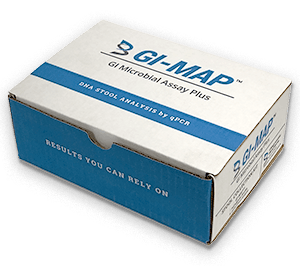GI MAP Stool Test
The Gastrointestinal Microbial Assay Plus (GI-MAP) is an innovative clinical tool that measures gastrointestinal microbiota DNA from a single stool sample with state of the art, quantitative polymerase chain reaction (qPCR) technology.
The GI-MAP was designed to detect microbes that may be disturbing normal microbial balance or contributing to illness as well as indicators of digestion, absorption, inflammation, and immune function.
Why Is Quantification Using qPCR Technology So Important?
Unlike other comprehensive stool tests on the market, the GI-MAP can provide practitioners with truly quantitative results. qPCR offers a much more accurate way to detect and quantify clinically-relevant organisms than standard PCR, culture, microscopy, or DNA sequencing- based methods. Accurately assessing how much of an organism’s DNA is present in a patient’s stool sample is essential for helping practitioners to determine the clinical significance of pathogenic organisms and dysbiosis patterns.
qPCR’s Reliability, Reproducibility, and Use in Clinical Research
Although qPCR is becoming more commonplace in in-vitro diagnostics (IVD), we are the only laboratory in the United States exclusively using qPCR technology for advanced comprehensive stool testing. This technology is used routinely in clinical and academic research because it provides highly-accurate quantification, as well as high levels of sensitivity and specificity. Standard PCR technology doesn’t offer the same level of sensitivity, or the ability to express precise numerical results.
The GI-MAP also provides consistently reproducible results. Reproducibility is of crucial importance to the practitioners and patients that rely on the efficacy of the GI-MAP. To achieve it, we perform rigorous quality control, and have validated all molecular target quantification assays to meet or exceed FDA standards.
GI-MAP Allows for the Personalized Treatment Plans and Informative Retests
The GI-MAP’s accuracy and reliability allows practitioners to create personalized treatment protocols to address gut dysfunction based on which infections are urgent, which areas of the gut are already optimized, and which areas should be addressed after an infection is resolved.
Additionally, the quantification offers a remarkable ability to see how treatment modalities are working because a retest after treatment can show whether a parasite has resolved, dysbiosis has improved, and more.
Who Should Have the GI-MAP Comprehensive Stool Analysis Done?
Almost every patient can benefit from a GI-MAP gut health assessment. Some patients are looking to achieve optimal health, while other patients have been chronically ill and frustrated without a diagnosis for years.
Some conditions that warrant testing are:
- Autoimmune diseases
- IBS/IBD
- Digestive complaints, diarrhea or constipation
- Brain fog
- Skin problems, like acne and psoriasis
- Mood disorders, depression, and anxiety
- Diabetes and weight loss issues



